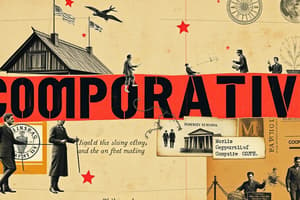Podcast
Questions and Answers
What is the purpose of a Performance Audit in a cooperative?
What is the purpose of a Performance Audit in a cooperative?
- To create a strategic plan for future services.
- To assess the management and officers' effectiveness for improvement. (correct)
- To conduct a market analysis of cooperative products.
- To evaluate the financial condition of individual members.
Which of the following best describes a Single-Line or Single-Purpose Cooperative?
Which of the following best describes a Single-Line or Single-Purpose Cooperative?
- A cooperative that diversifies into multiple business sectors.
- A cooperative organized solely for profit generation.
- A cooperative providing various unrelated services to members.
- A cooperative that focuses solely on its main line of business. (correct)
What encompasses the activities of Service Cooperatives?
What encompasses the activities of Service Cooperatives?
- A combination of services including housing and education. (correct)
- Investment ventures unrelated to member services.
- Manufacturing and production businesses.
- Only financial services such as banking and credit.
What distinguishes a Subsidiary Cooperative?
What distinguishes a Subsidiary Cooperative?
What is the accountability role of cooperatives within the community?
What is the accountability role of cooperatives within the community?
What is the primary purpose of a cooperative according to its concern for the community?
What is the primary purpose of a cooperative according to its concern for the community?
Which term best describes the body responsible for managing the affairs of a cooperative?
Which term best describes the body responsible for managing the affairs of a cooperative?
What is the role of the General Assembly in a cooperative?
What is the role of the General Assembly in a cooperative?
Who can qualify as a member of a cooperative?
Who can qualify as a member of a cooperative?
What does the term 'Articles of Cooperation' refer to?
What does the term 'Articles of Cooperation' refer to?
What is the purpose of a Social Audit in a cooperative?
What is the purpose of a Social Audit in a cooperative?
Which of the following best encapsulates the function of the Cooperative Development Authority?
Which of the following best encapsulates the function of the Cooperative Development Authority?
What does the term 'Representative Assembly' signify within a cooperative?
What does the term 'Representative Assembly' signify within a cooperative?
What is the title of the act that amends the Cooperative Code of the Philippines?
What is the title of the act that amends the Cooperative Code of the Philippines?
What is the primary purpose of the policy declared by the State regarding cooperatives?
What is the primary purpose of the policy declared by the State regarding cooperatives?
Which principle does the State recognize according to the Cooperative Code?
Which principle does the State recognize according to the Cooperative Code?
What type of organization is defined as a cooperative in the amended act?
What type of organization is defined as a cooperative in the amended act?
What are the members of a cooperative expected to contribute?
What are the members of a cooperative expected to contribute?
How does the State plan to help cooperatives grow according to the act?
How does the State plan to help cooperatives grow according to the act?
What do members of a cooperative agree to accept as part of their participation?
What do members of a cooperative agree to accept as part of their participation?
What is the scope of the cooperative's activities as recognized by the Philippine Cooperative Code?
What is the scope of the cooperative's activities as recognized by the Philippine Cooperative Code?
What principle emphasizes the right of all individuals to join cooperatives without discrimination?
What principle emphasizes the right of all individuals to join cooperatives without discrimination?
How are the voting rights structured among members in primary cooperatives?
How are the voting rights structured among members in primary cooperatives?
What should cooperatives do with their surpluses according to cooperative principles?
What should cooperatives do with their surpluses according to cooperative principles?
What principle ensures that the cooperative operates independently regardless of external agreements?
What principle ensures that the cooperative operates independently regardless of external agreements?
What is one of the key focuses of the Education, Training and Information principle?
What is one of the key focuses of the Education, Training and Information principle?
What is the purpose of cooperation among cooperatives according to the principles?
What is the purpose of cooperation among cooperatives according to the principles?
Which cooperative principle relates to member contributions to capital?
Which cooperative principle relates to member contributions to capital?
What is a key requirement for cooperatives when raising capital from external sources?
What is a key requirement for cooperatives when raising capital from external sources?
Flashcards
What is the Philippine Cooperative Code of 2008?
What is the Philippine Cooperative Code of 2008?
The Philippine Cooperative Code of 2008 is the law that governs cooperatives in the Philippines.
What is the primary goal of the Philippine Cooperative Code of 2008?
What is the primary goal of the Philippine Cooperative Code of 2008?
The primary goal of the Philippine Cooperative Code is to support the growth and development of cooperatives to achieve economic development and social justice.
How does the Philippine government support cooperatives?
How does the Philippine government support cooperatives?
The Philippine government actively encourages the formation and growth of cooperatives by providing technical guidance, financial assistance, and other vital services.
What is the principle of autonomy in cooperatives?
What is the principle of autonomy in cooperatives?
Signup and view all the flashcards
What is the principle of subsidiarity in cooperatives?
What is the principle of subsidiarity in cooperatives?
Signup and view all the flashcards
What is a cooperative?
What is a cooperative?
Signup and view all the flashcards
How is a cooperative governed?
How is a cooperative governed?
Signup and view all the flashcards
What are the key principles of a cooperative?
What are the key principles of a cooperative?
Signup and view all the flashcards
Voluntary and Open Membership
Voluntary and Open Membership
Signup and view all the flashcards
Democratic Member Control
Democratic Member Control
Signup and view all the flashcards
Member Economic Participation
Member Economic Participation
Signup and view all the flashcards
Autonomy and Independence
Autonomy and Independence
Signup and view all the flashcards
Education, Training and Information
Education, Training and Information
Signup and view all the flashcards
Cooperation Among Cooperatives
Cooperation Among Cooperatives
Signup and view all the flashcards
Social Performance
Social Performance
Signup and view all the flashcards
Performance Audit
Performance Audit
Signup and view all the flashcards
Single-Purpose Cooperative
Single-Purpose Cooperative
Signup and view all the flashcards
Service Cooperatives
Service Cooperatives
Signup and view all the flashcards
Subsidiary Cooperative
Subsidiary Cooperative
Signup and view all the flashcards
Member
Member
Signup and view all the flashcards
General Assembly
General Assembly
Signup and view all the flashcards
Board of Directors
Board of Directors
Signup and view all the flashcards
Committee
Committee
Signup and view all the flashcards
Articles of Cooperation
Articles of Cooperation
Signup and view all the flashcards
Bylaws
Bylaws
Signup and view all the flashcards
Registration
Registration
Signup and view all the flashcards
Social Audit
Social Audit
Signup and view all the flashcards
Study Notes
Philippine Cooperative Code of 2008
- Title: This act is known as the Philippine Cooperative Code of 2008.
- Policy Declaration: The State promotes self-reliance and economic development via cooperatives, encouraging the private sector's role in their formation, and fostering an environment conducive to their growth.
- Government Role: The government provides technical and financial assistance to enable cooperatives to become viable. Government support must not infringe upon cooperative autonomy.
- Subsidiarity: Cooperatives regulate their internal processes, with government assistance where needed. They initiate, organize, train, support, and audit themselves.
General Concepts
- Cooperative Definition: An autonomous, duly registered association of individuals with shared interests, who contribute equitably to the capital while accepting risks and benefits of the cooperative enterprise.
- Cooperative Principles: Principles include voluntary membership with no discrimination; democratic member control with equal voting rights; member economic participation, autonomy and independence, education, training and information, and cooperation among themselves.
- Member Control: Members actively participate in setting policies, and elected representatives are accountable. Primary cooperatives have one member, one vote.
- Member Economic Participation: Members contribute to the capital, share in surpluses (reserves, business patronage, and supplementary activities).
Additional Terms and Definitions
- Member: Natural or legal persons adhering to cooperative principles, admitted as a member by the cooperative.
- General Assembly: The full membership, or delegates in large cooperatives, for exercising rights and duties (in accordance with bylaws).
- Board of Directors: Body managing cooperative affairs.
- Committees: Designated bodies with specific responsibilities (bylaws or assembly resolution).
- Articles of Cooperation: Registered documents outlining cooperative structure.
- Bylaws: Registered rules and regulations.
- Registration: Act granting the cooperative a legal personality (evidenced by a certificate).
- Cooperative Development Authority (CDA): Government agency responsible for registration and regulation.
- Universally Accepted Principles: Guiding principles cooperatives worldwide adhere to.
- Representative Assembly: Representatives elected by each district/sector for exercising lawful powers delegated by the general assembly.
- Officers: Board members, committee members, general manager(s).
- Social Audit: Evaluating a cooperative’s social performance, impact, and social responsibility.
- Performance Audit: Assessing efficiency, management, and overall performance.
- Single-Line/Single-Purpose Cooperatives: Focused on a specific service or business type.
- Service Cooperatives: Offer various services (transport, insurance, communication, etc.).
- Subsidiary Cooperatives: Multiple primary cooperatives operating in the same business area for support (e.g., locally organized municipal-level cooperatives)
Studying That Suits You
Use AI to generate personalized quizzes and flashcards to suit your learning preferences.




